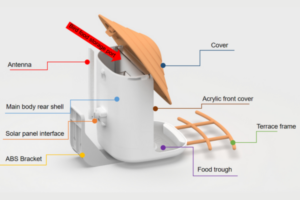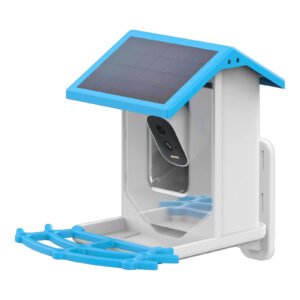Raccoons can be a serious nuisance when it comes to bird feeders. Their intelligence and agility allow them to access feeders, often disrupting feeding times for your birds. If you’re tired of raccoons raiding your bird feeder and preventing your feathered friends from enjoying their meals, there are a few ways to solve this problem effectively.
Raccoons are clever creatures that can easily get into your bird feeder, causing chaos and frustration. To stop them, you’ll need to take preventative measures like using raccoon-proof materials, setting up barriers, or choosing the right feeder. This article offers practical solutions to help you protect your bird feeder from these clever animals.
Don’t let raccoons spoil your bird watching experience. Read on to discover how you can keep them away for good.
How Do I Keep Raccoons Off My Bird Feeder?
Raccoons are nocturnal animals, and they’re particularly active at night, making your bird feeder a prime target. To keep them off, one of the best solutions is to install a raccoon-proof bird feeder pole with a raccoon baffle. The baffle, often placed around the pole, prevents raccoons from climbing up and accessing the feeder. Make sure your bird feeder is mounted high enough and the pole is smooth to deter raccoons from gaining a foothold. Additionally, regular cleaning of the feeder and surrounding area will eliminate the scents that might attract these pests.
How Do You Make a Raccoon-Proof Bird Feeder?
Creating a DIY raccoon-proof bird feeder is possible with a few materials and careful planning. First, choose a feeder that has a tight, well-secured lid. You can add a raccoon baffle beneath the feeder or install a baffle around the pole to block raccoons from climbing. Make sure that the feeder is placed high off the ground and that it’s difficult to reach from nearby trees, fences, or structures. Lastly, consider placing hot pepper or other deterrents around the feeder to keep raccoons from getting too close.
What Material is Raccoon Proof?
Certain materials are more resistant to raccoons’ climbing abilities and attempts to access feeders. Metal is one of the most raccoon-proof materials due to its sturdiness and smooth surface, which prevents raccoons from getting a grip. Additionally, plastic feeders with secure lids can work well when coupled with a raccoon baffle. Avoid using wooden feeders as they are easier for raccoons to chew through or manipulate.
What Will Make Raccoons Stay Away?
To make raccoons stay away, start by installing physical barriers like raccoon-proof bird feeder poles and raccoon baffles. However, deterrents can also be effective. Scents like cinnamon, ammonia, or garlic can deter raccoons from approaching your feeder. Using motion-sensor lights or sprinklers around the area may also scare raccoons off. If you’re using a squirrel and raccoon-proof bird feeder, be sure it’s not easily accessible by these clever animals.
What Smell Do Raccoons Hate the Most?
Raccoons have a strong sense of smell and can be repelled by certain scents. Some of the smells they dislike include cinnamon, peppermint, garlic, and pine. To deter raccoons from approaching your bird feeder, you can use scented oils or herbal sprays to keep them at bay. Placing these scents near the feeder or on the raccoon-proof bird feeder pole can be an effective strategy.
Does Irish Spring Keep Raccoons Away?
Many people swear by using Irish Spring soap to keep raccoons away. The strong scent of the soap seems to be a deterrent for raccoons and other animals like squirrels. You can hang bars of Irish Spring soap near the bird feeder or rub it along the feeder pole to discourage raccoons from approaching. However, this method may need to be repeated frequently to remain effective.
What Do Raccoons Hate the Most at Night?
At night, raccoons are most active, and keeping them away can be challenging. Raccoons dislike bright lights and motion sensors, which can be installed near your bird feeder. Additionally, sounds like ultrasonic repellers can drive them away by emitting frequencies that raccoons find irritating. Strong smells, like those of peppermint or ammonia, can also make raccoons avoid areas where they typically forage at night.
What Does Vinegar Do to Raccoons?
Vinegar is another smell that raccoons find unpleasant. Vinegar spray can be used around your bird feeder or on the raccoon-proof bird feeder pole to create an odor barrier that raccoons will avoid. Additionally, vinegar can help cleanse the area of any lingering scents that may attract them. Keep in mind that vinegar may need to be reapplied after rainfall or over time for maximum effectiveness.
Does Pine Sol Repel Raccoons?
Pine Sol is often used as a cleaner, but its scent also has the potential to repel raccoons. The strong, pine-like odor can deter raccoons from approaching your bird feeder. You can apply a diluted solution of Pine Sol to areas near the feeder or use it in a raccoon baffle setup. Be sure to test this method and adjust the concentration if necessary to avoid any potential harm to your plants or wildlife.
Conclusion
Keeping raccoons away from your bird feeder can be a challenge, but with the right strategies, it’s certainly possible. From installing raccoon-proof bird feeder poles and raccoon baffles to using natural deterrents like Irish Spring soap and vinegar, there are many ways to protect your bird feeder and enjoy a peaceful birdwatching experience. Don’t let raccoons ruin your bird feeder—take action today!






